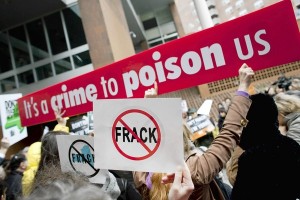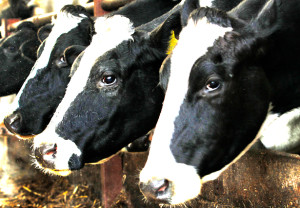Four States Confirm Water Pollution From Gas Drilling
In at least four states that have been hit with fracking, hundreds of complaints have been made about well-water contamination from oil or gas drilling, and pollution was confirmed in a number of them. The Associated Press requested data on drilling-related complaints in Pennsylvania, Ohio, West Virginia and Texas and found major  differences in how the states report such problems. Texas provided the most detail, while the other states provided only general outlines. And while the confirmed problems represent only a tiny portion of the thousands of oil and gas wells drilled each year in the U.S., the lack of detail in some state reports could help fuel public confusion and mistrust. The AP found that Pennsylvania received 398 complaints in 2013 alleging that oil or natural gas drilling polluted or otherwise affected private water wells, compared with 499 in 2012. The Pennsylvania complaints can include allegations of short-term diminished water flow, as well as pollution from stray gas or other substances. More than 100 cases of pollution were confirmed over the past five years.
differences in how the states report such problems. Texas provided the most detail, while the other states provided only general outlines. And while the confirmed problems represent only a tiny portion of the thousands of oil and gas wells drilled each year in the U.S., the lack of detail in some state reports could help fuel public confusion and mistrust. The AP found that Pennsylvania received 398 complaints in 2013 alleging that oil or natural gas drilling polluted or otherwise affected private water wells, compared with 499 in 2012. The Pennsylvania complaints can include allegations of short-term diminished water flow, as well as pollution from stray gas or other substances. More than 100 cases of pollution were confirmed over the past five years.
Obama Opens Eastern Seaboard to Oil Exploration
The Obama administration is reopening the Eastern Seaboard to offshore oil and gas exploration, approving seismic  surveys using sonic cannons that can pinpoint energy deposits deep beneath the ocean floor. The cannons create noise pollution in waters shared by whales, dolphins and turtles, sending sound waves many times louder than a jet engine reverberating through the deep every ten seconds for weeks at a time. The sonic cannons are often fired continually for weeks or months, and multiple mapping projects may operate simultaneously.? Whales and dolphins depend on being able to hear their own much less powerful echolocation to feed, communicate and keep in touch with their family groups across hundreds of miles. Even fish and crabs navigate and communicate by sound. The bureau’s environmental impact study estimates that more than 138,000 sea creatures could be harmed, including nine of the world’s remaining 500 north Atlantic right whales. This will? undoubtedly be an environmental disaster and disrupt the lives of thousands of sea creatures.
surveys using sonic cannons that can pinpoint energy deposits deep beneath the ocean floor. The cannons create noise pollution in waters shared by whales, dolphins and turtles, sending sound waves many times louder than a jet engine reverberating through the deep every ten seconds for weeks at a time. The sonic cannons are often fired continually for weeks or months, and multiple mapping projects may operate simultaneously.? Whales and dolphins depend on being able to hear their own much less powerful echolocation to feed, communicate and keep in touch with their family groups across hundreds of miles. Even fish and crabs navigate and communicate by sound. The bureau’s environmental impact study estimates that more than 138,000 sea creatures could be harmed, including nine of the world’s remaining 500 north Atlantic right whales. This will? undoubtedly be an environmental disaster and disrupt the lives of thousands of sea creatures.
Beef Pollutes More Than Pork & Poultry
A new study finds that raising beef for the American dinner table does far more damage to the environment than producing pork, poultry, eggs or dairy. According to the study, published in the journal Proceedings of the National Academy of Sciences, compared with the other animal proteins, beef produces five times more heat-trapping gases per calorie, puts out six times as much water-polluting nitrogen, takes 11 times more water for irrigation and uses 28 times the land. Cows are not efficient at converting feed to protein for human consumption, said lead author Gidon Eshel, an environmental physics professor at Bard College in New York. Eshel used U.S. government figures to calculate air and water emissions and how much water and land were used in the lifetime production of beef, pork, poultry, dairy and eggs. While other studies have looked at the issue, this is one of the most comprehensive pieces of research quantifying and comparing the U.S. environmental costs of different meats and other animal protein. In the study, pork, poultry, dairy and eggs all had comparable environmental footprints, so close there were no statistically significant differences among them, But cows were off-the-chart different. If the average American switched from beef to pork, it would reduce the equivalent of 1,200 pounds of carbon dioxide a year, which is about nine days’ worth of the nation’s per capita greenhouse gas emissions. If really want to make a positive environmental impact, skip meat all together. Click here for some great vegetarian recipe options.
calorie, puts out six times as much water-polluting nitrogen, takes 11 times more water for irrigation and uses 28 times the land. Cows are not efficient at converting feed to protein for human consumption, said lead author Gidon Eshel, an environmental physics professor at Bard College in New York. Eshel used U.S. government figures to calculate air and water emissions and how much water and land were used in the lifetime production of beef, pork, poultry, dairy and eggs. While other studies have looked at the issue, this is one of the most comprehensive pieces of research quantifying and comparing the U.S. environmental costs of different meats and other animal protein. In the study, pork, poultry, dairy and eggs all had comparable environmental footprints, so close there were no statistically significant differences among them, But cows were off-the-chart different. If the average American switched from beef to pork, it would reduce the equivalent of 1,200 pounds of carbon dioxide a year, which is about nine days’ worth of the nation’s per capita greenhouse gas emissions. If really want to make a positive environmental impact, skip meat all together. Click here for some great vegetarian recipe options.

Comments are closed.